Reproductive rights were on the ballot in a record five states — California, Michigan, Vermont, Kentucky and Montana — during the midterm elections earlier this month, and the will of the people was resounding: the majority of Americans are in favor of choice when it comes to abortion access.
In California, the passage of Measure 1 by voters changed the state’s constitution to assure women’s right to an abortion and to acquire contraceptives, establishing some of the strongest protections in the country. But Gov. Gavin Newsom had been a fierce proponent of the right to choose even before that, signing a package of 12 bills in September following the U.S. Supreme Court’s decision to overturn Roe v. Wade earlier this year.
Dobbs v. Jackson Women’s Health Organization marked a landmark decision by the conservative majority-led Supreme Court, which held that the U.S. Constitution does not confer a right to abortion, but rather that individual states should have the full power to regulate these services. Suddenly women in “red states” lost the power to make decisions about their own bodies, and women in “blue states” wondered if our rights were as protected as we thought they were.
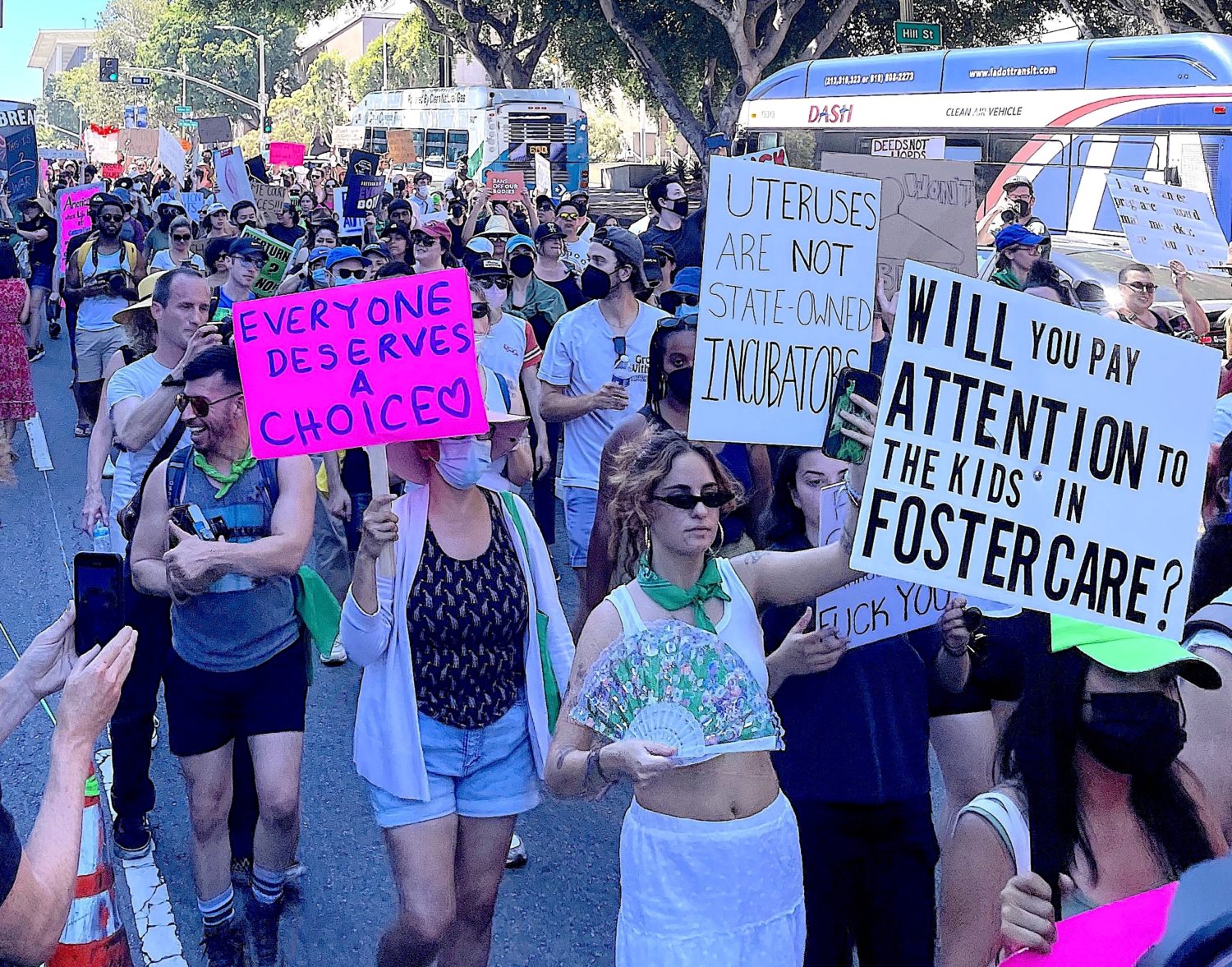
The streets of L.A. after Roe v Wade was overturned (Charlotte Pinkerson)
“An alarming number of states continue to outlaw abortion and criminalize women, and it’s more important than ever to fight like hell for those who need these essential services,” Newsom said in a statement after the signings. “We’re doing everything we can to protect people from any retaliation for accessing abortion care, while also making it more affordable to get contraceptives.”
No matter how one may feel about the governor’s policies in general, his stance on abortion rights has been unwavering and respectful of choice. Some of the most significant measures he’s made into law include AB223 (which protects a pregnant person who chooses to end a pregnancy from prosecution and abolishes the requirement for coroners to investigate stillbirths); AB 2626 (which prevents medical boards from punishing or revoking licenses from doctors, physician’s assistants, nurse practitioners and midwives for performing abortions); and, AB 2091 (which prohibits medical providers and health insurers from disclosing abortion-related medical records to out-of-state law enforcement officials, as well as protects someone who has knowledge of an abortion from disclosing the identity of the person who got it).
In terms of our state’s sanctuary state status, one of the most consequential bills signed by Newsom is SB 1142, which expands and strengthens access to reproductive care, not only for Californians, but for those who come here from other more restrictive states by establishing a fund to help them. Just as significantly, it also led to the creation of a comprehensive webpage for those seeking reproductive services in California, regardless of where they live.
Abortion.ca.gov/ launched in September, and it is proving to be an invaluable tool, addressing every question and concern a woman might encounter, from planning, travel, lodging and child care to financial and emotional support. Put together by Newsom’s office with input from the California Legislative Women’s Caucus, which includes representatives from Planned Parenthood of California, the site is a one-stop shop of sorts for abortion information and resources.
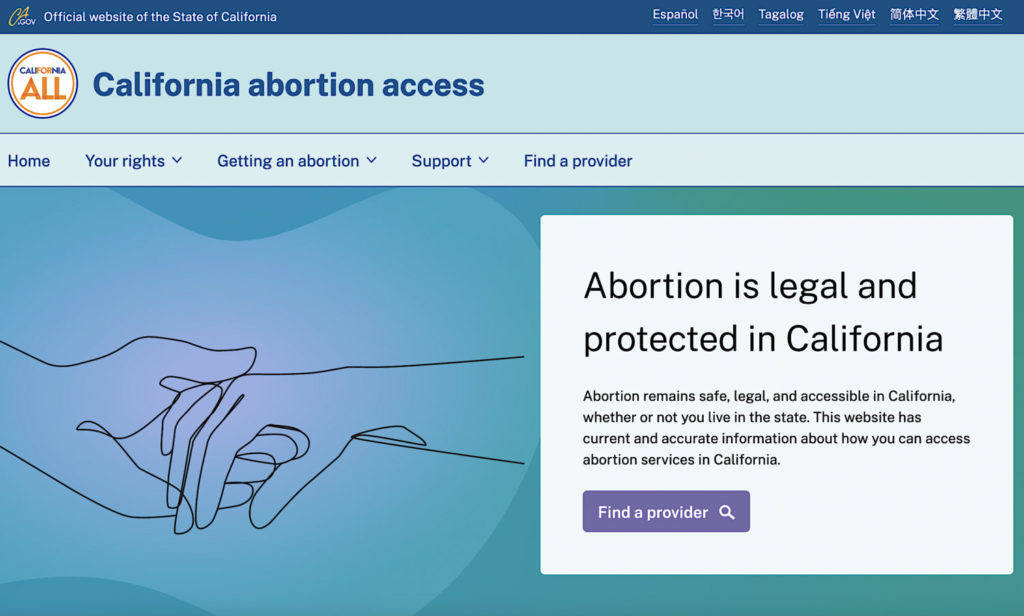
(Screenshot Abortion.ca.gov/)
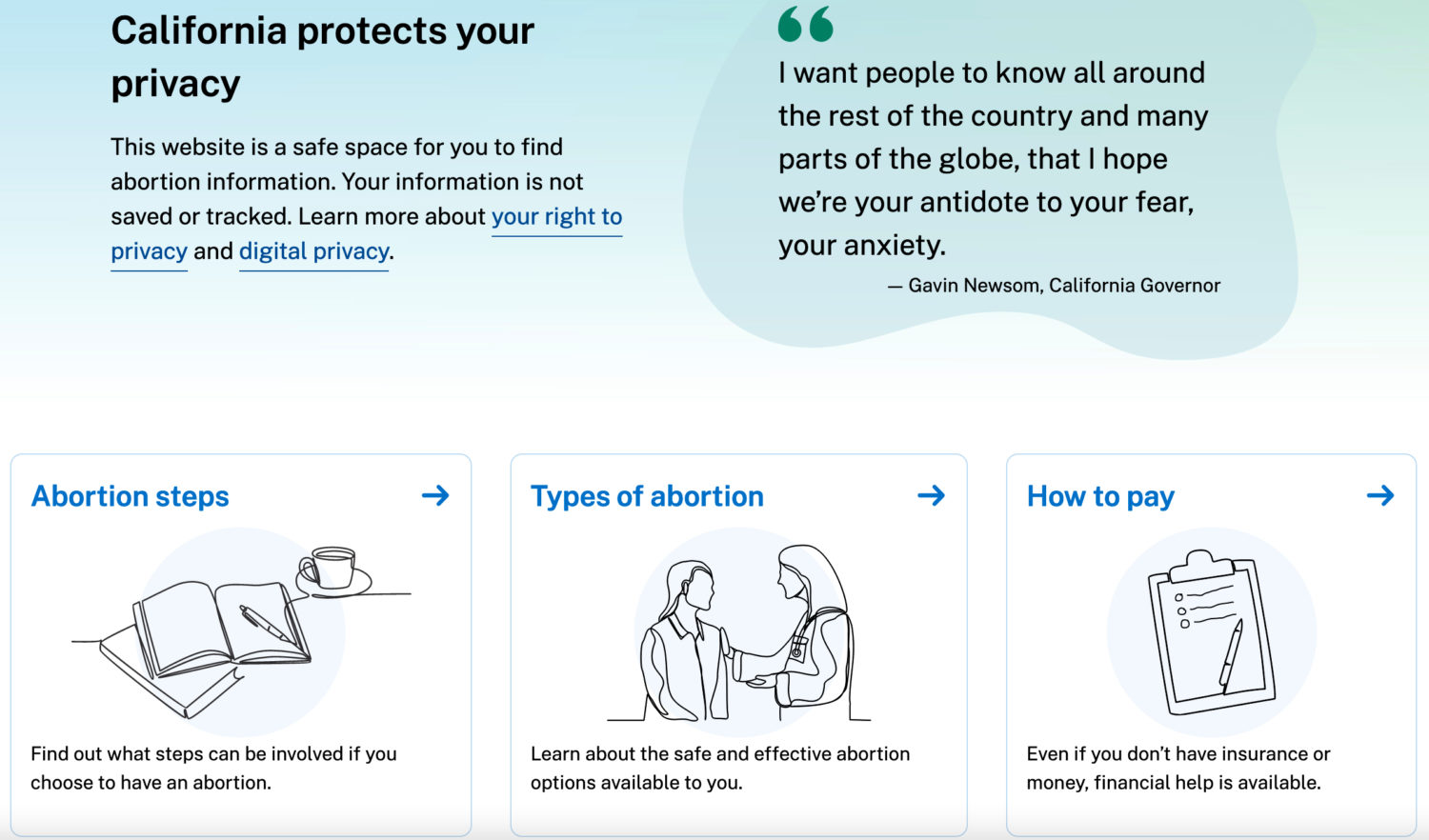
(Screenshot Abortion.ca.gov/)
Many of us were shocked when Roe v. Wade was actually overturned, but for those who were watching closely, the writing was on the wall after Donald Trump was able to get his three conservative justices confirmed to the Supreme Court and Texas’ Gov. Greg Abbott started making moves to restrict rights there. Planned Parenthood, along with other reproductive rights and justice organizations created the Future of Abortion Council a little over a year ago on the heels of Texas’ abortion ban, even prior to Dobbs.
“We were seeing a trickle of patients coming in from out of state and so we put the group together, because there were so many questions about legalities and what would happen with providers if they were turned in and fined,” says Jodi Hicks, CEO and president of Planned Parenthood Affiliates of California. “And then looking forward, we had an understanding that Dobbs was not going to go well. So it was really about looking at California as a reproductive freedom state. What are the barriers that exist? California has been good on rights, not as good on access to care. With an understanding that rights don’t mean anything if you can’t actually access the care that you need, it was a good time to look at that.”
The group also sought to address what might happen if more conservatively governed states should institute bans on abortion. If people started coming from out of state, what could our legislature and rights groups here do to help? As an example, if one tries to find an abortion provider, via say Kaiser Permanente, the traditional way is to enter a zip code into their website, which then brings up everything around you that’s nearby. That no longer works for someone in Texas, and the result is a lot of women not knowing where to begin if they want to come here. The website was created with this in mind.

Jodi Hicks (Courtesy Planned Parenthood)
“If we sent the message out through all of our work that California is a haven state and you can come here, how would people get the information they need?” Hicks explains about the site. “If you Google “California abortion,” this website comes up. And rather than punching in a zip code, it brings up the map of all the providers and you can click on where you could go. What we’re finding with patient behavior is sometimes it’s very specific. And we know there’s an uptick in any city that has an airport close by. But also, sometimes it’s just about, ‘I have a cousin in San Jose, let’s see what’s available there.’ You can sort of click and see around, and then have all the other tools that you need, like abortion access funds, like your rights, like what is the law in California. It was done as a better tool for people in California, but it was very intentional for helping people that are out of state and don’t know where to go.”
Input was sought from policymakers, consultants and Planned Parenthood colleagues from out of state when creating the online destination, even as everyone hoped it might not actually be needed. Wrapping our heads around losing a fundamental right we’ve always known has been part of the challenge. “I think what was so innovative and intentional and thoughtful about the website is most of us in our generation have never lived in a world that didn’t have a Roe v. Wade protection,” adds Hicks. “But this is where we are.”

(Courtesy Planned Parenthood)
California’s stance and the Midterm results in general are bright spots in what has otherwise been a scary Handmaid’s Tale-like turn of events in our country. The Supreme Court’s ruling in June eliminated rights that have stood for nearly five decades, and abortion bans across the country have seen many of our worst fears become a reality. Abortion clinics here already have reported upswings in out-of-state patients seeking procedures, and this is sure to increase as more Republican-led states allow religious beliefs to dictate lawmaking.
While we are extremely lucky to live in a state that respects women’s bodies and health care choices, it wasn’t always this way. California saw many black market abortions, maternal deaths and high-profile trials against physicians before abortion was finally decriminalized. Abortion was illegal in the state until 1967, when former Gov. Ronald Reagan signed the Therapeutic Abortion Act, which authorized physicians to perform abortions in a hospital in cases resulting from rape or incest or that endangered the physical or mental health of the mother.
Abortion was nationally decriminalized in 1973 via Roe v. Wade, but providers were still pretty scarce, and the threat of losing the right to terminate a pregnancy has always hung over our heads, even here in Los Angeles. This inspired women to mobilize in big ways. Thirty years ago, when we just started interning here at LA Weekly, our music editor Sue Cummings and L7’s Donita Sparks (who also worked here, in the art department) formed Rock for Choice with the Feminist Majority Foundation. The group created a series of benefit concerts to raise money for abortion rights groups and clinics during President George H.W. Bush’s administration, when the Supreme Court started restricting abortion by state via parental consent laws and mandatory waiting periods.
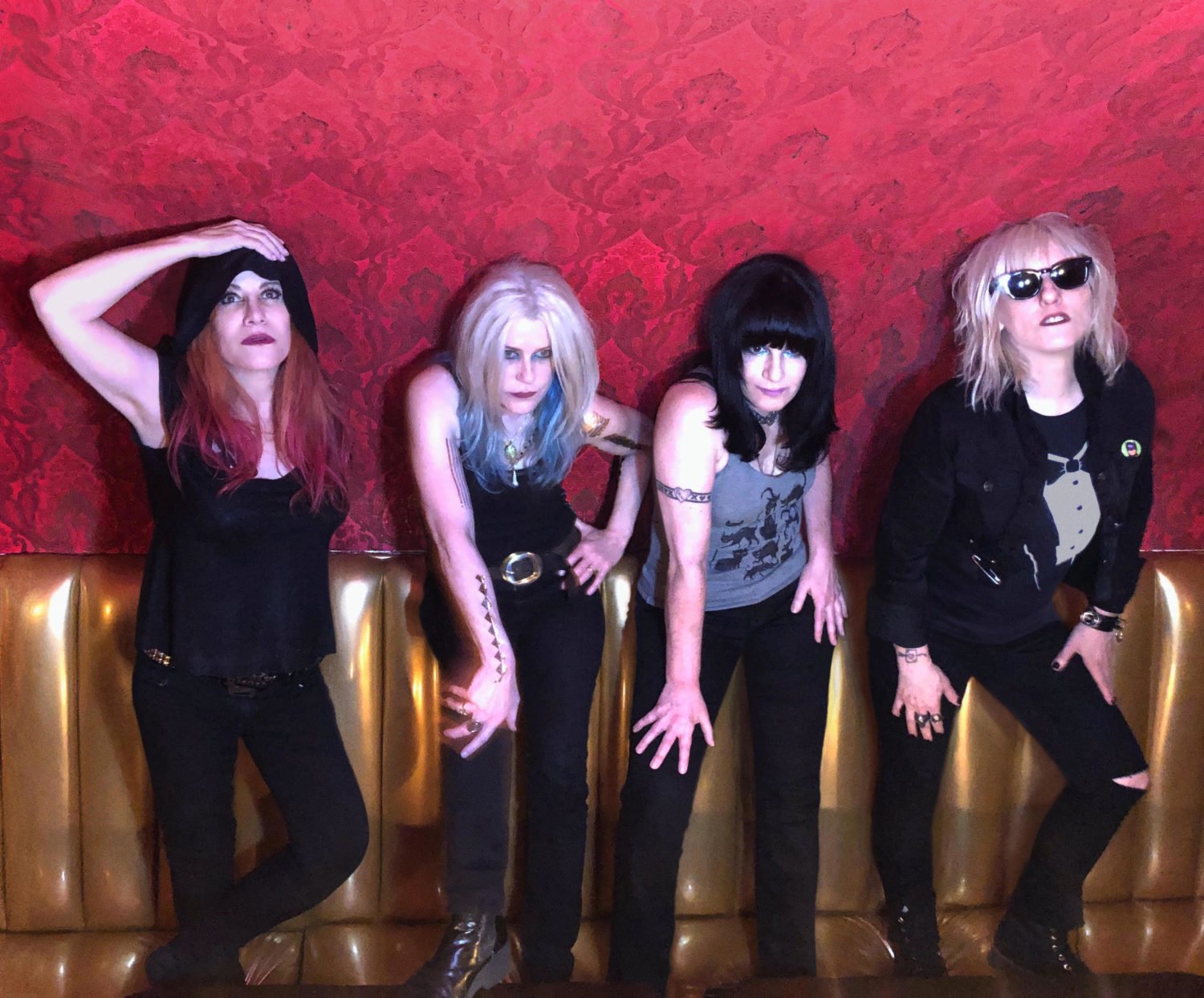
L7 (Robert Fagan)
The first Rock for Choice show at The Palace in Hollywood (now called Avalon) took place in 1991 and featured Nirvana, Hole, L7 and Sister Double Happiness. More shows followed at the Palladium with big bands including Pearl Jam, Fugazi and later, No Doubt, Rage Against the Machine, the Foo Fighters, Bikini Kill and Joan Jett.
A few years later, another group of female creators – including X’s Exene Cervenka and author Nicole Panter – formed the short-lived but effective Bohemian Women’s Political Alliance (BWPA), a “pro-woman, pro-choice, pro-child, pro-minority, pro-queer, pro-Earth, prolific, prodigious, profane, pro-arts, pro-change, pro-union and anti-censorship” group hosting events around town, including music shows, also at the Palladium. It raised money and awareness for Democratic, pro-choice local government figures including Barbara Boxer and Jackie Goldberg.
With the overturning of Roe v. Wade, we caught up with our friend Sparks to discuss the ongoing struggle and how things have changed since her band started the fight for rights three decades ago. Of course, she feels the Supreme Court’s decision was a “tragedy and a travesty,” like many of us do. Though she and L7 stepped back from the level of activism they participated in back in the ‘90s, we agreed that it’s time for the next generation of female musicians to take up the cause.
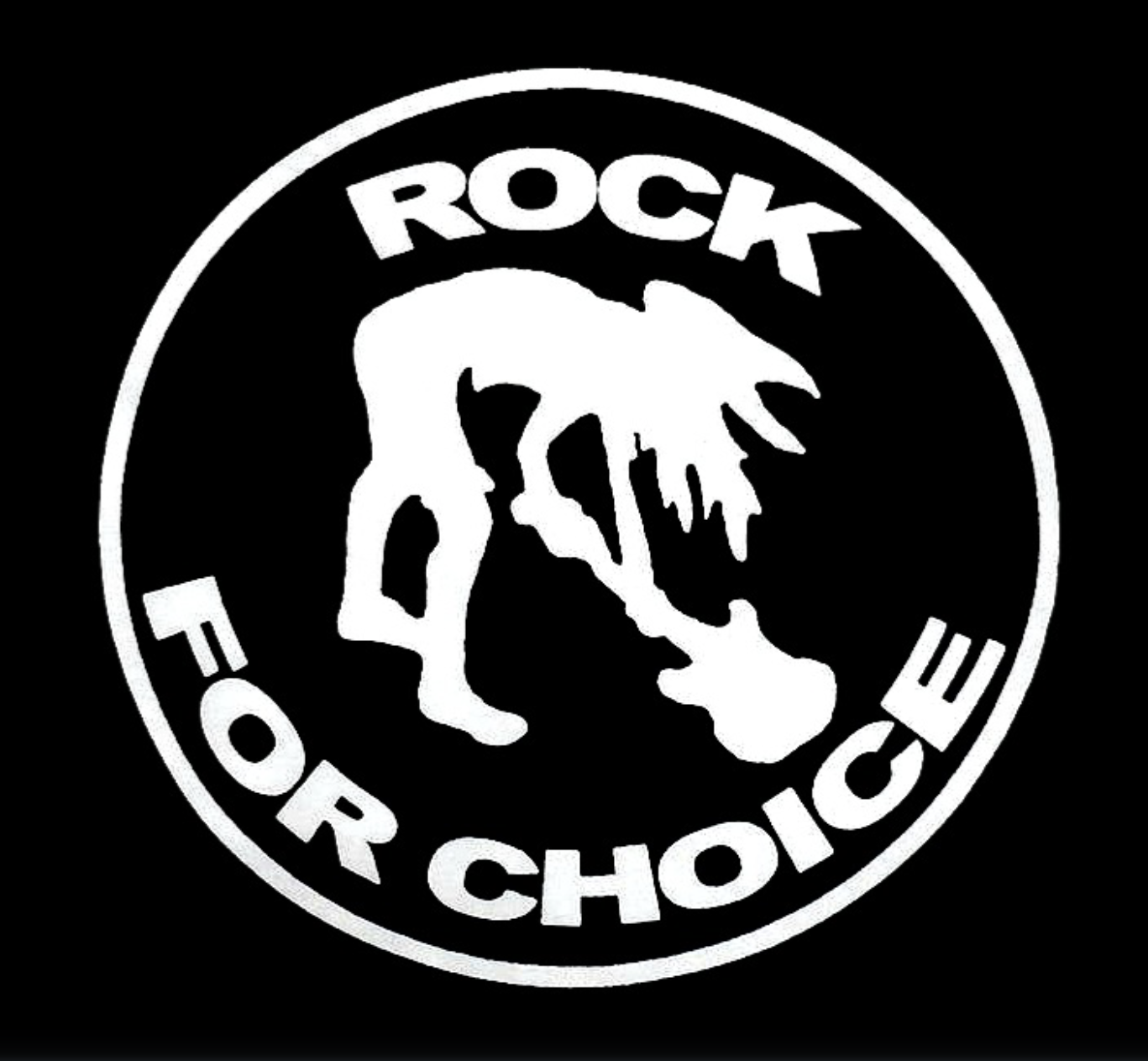
Rock for Choice logo (Courtesy L7)
“I think people look to L7 to start that up again and that’s not going to happen right now,” says Sparks, who co-created the name and logo, depicting the silhouette of her drummer Dee Plakas smashing a guitar. “You know, we felt like, ‘Hey, man, we’ve been bringing the brownies for years and now it’s time for someone else to do it.’ Also, a lot of journalists started to focus on it in our interviews, and we wanted to talk more about our music. We were becoming a political band, which was never our intention. We were just concerned citizens doing our civic duty and our artistic duty by giving back, but we never considered ourselves a political platform band. We wanted it to go on, of course, but we had to pull back.”
L7 may not have been a political band per se, but their music always reflected societal woes. Sparks wrote their hit “Pretend We’re Dead’ about voter apathy, a persistent problem in our country. Had more people actually voted, Trump probably wouldn’t have won the presidency and women wouldn’t currently be suffering from his Supreme Court nominees’ restrictive decisions. Of course, Kentucky Senator and former Republican Majority leader Mitch McConnell’s blockage of President Barack Obama’s SCOTUS nominee Merrick Garland (now U.S. Attorney General), played a part, as did the death of women’s rights champion Justice Ruth Bader Ginsburg in September of 2020.
We covered and went to a few Rock for Choice shows back in its heyday, but we never let ourselves believe the danger of losing Roe was as real as it was. Maybe that’s why the whole thing went sort of dormant? When Bill Clinton got elected in 1992, we all relaxed a bit during his two terms, but the narrow victory of Bush’s son – who was previously the Governor of Texas let’s not forget – against Al Gore in 2000 and his reelection four years later, actually put a lot of what we’re dealing with today in motion. Not only did Bush Jr. nominate conservative Justices Samuel Alito and John Roberts, but his elevation of conservative judges like Brett Kavanaugh and Neil Gorsuch to federal judgeships set up both to eventually advance to the highest court in the land and, ultimately, grant right wing and evangelical groups their most fervent wish.
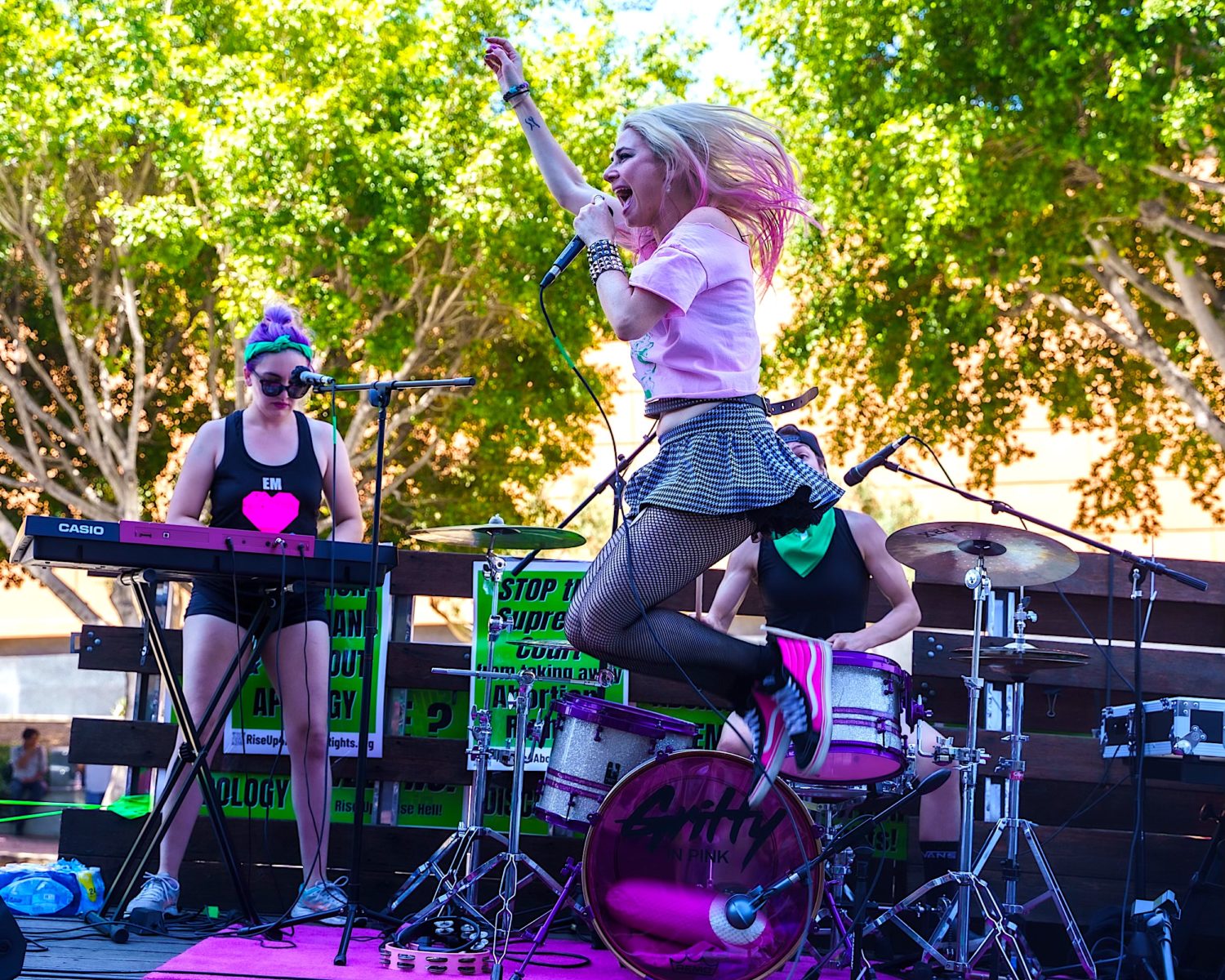
Shira Yevin performing Gritty in Pink Rise Up set (Louie Figueroa)
Rock for Choice still exists as part of the Feminist Majority, but it’s not as active as it could or should be considering the current climate. Would Sparks like to see it reignited? Hell yes. “I know that there are events happening for other organizations,” she says. “I feel like some of these huge women in pop, whose main audience are childbearing teenagers, if they were to come forward and do a mega telethon or something to raise money for Planned Parenthood, that would be great.”
Sparks is right, we need someone big to put reproductive rights and health care back onto the forefront of pop culture, and we need it now more than ever. But it’s a different world and social media seems to be the way to speak out these days. That has value, but true action has to go beyond a computer or phone screen. Unfortunately it’s easier to make online posts and tweets than actually get out into the streets and do something.
But there are a few. Gritty In Pink, an L.A. collective of musicians that prides itself on empowering women in music, took the fight to the Downtown L.A. just hours after the Dobbs decision came through in association with Rise Up For Abortion Rights L.A. Chapter. They’ve done local club shows to raise funds and awareness as well.
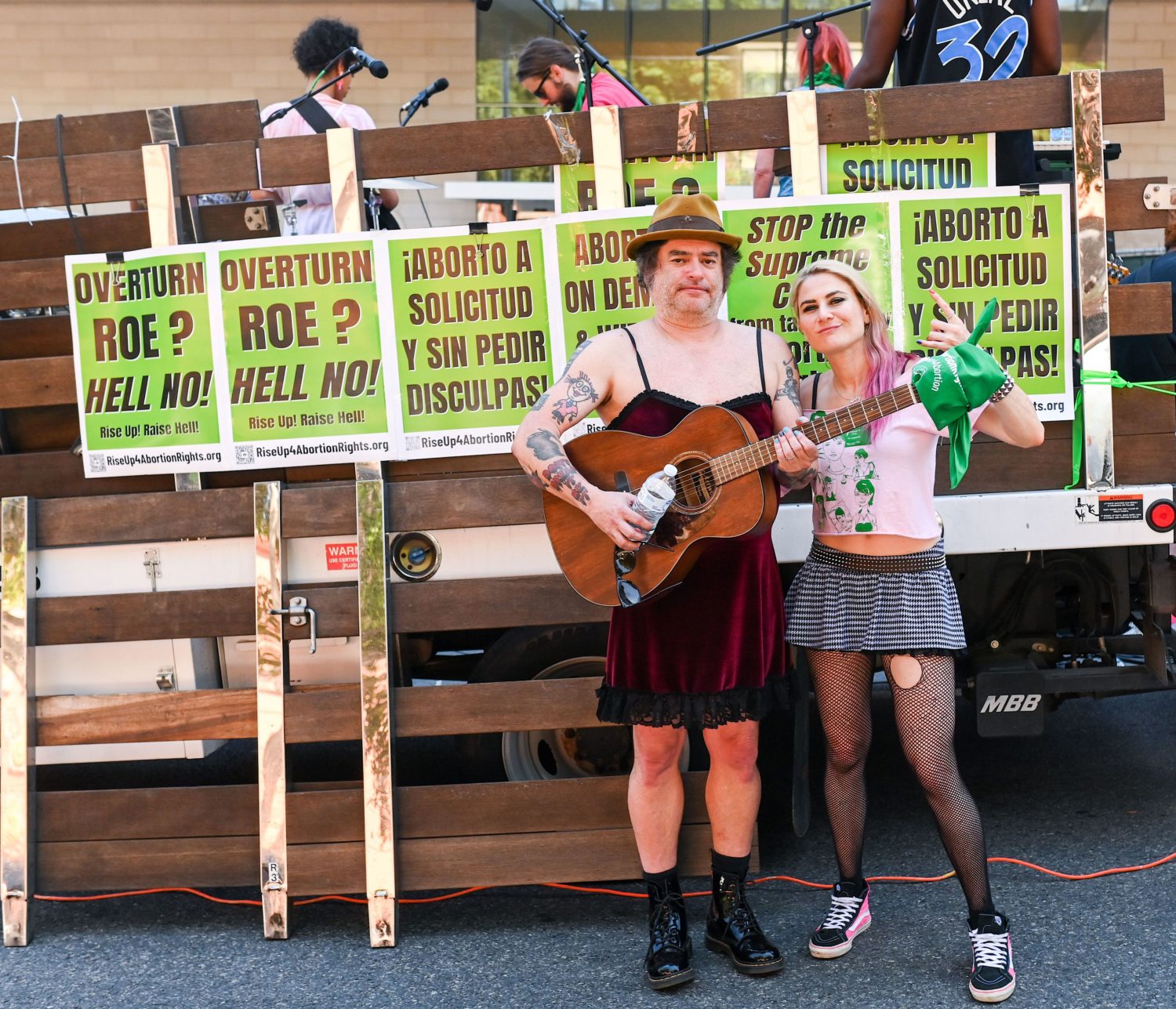
Fat Mike and Shira Yevin (Louie Figueroa)
“It is still unthinkable that Roe v. Wade got overturned this year,” says Gritty’s organizer Shira Yevin. “When we heard the news, we immediately dropped everything and headed downtown to the federal courthouse to protest with other women in our community. Gritty In Pink decided to throw together the flatbed truck protest concert as a way to join with others in the activist community and assert our voices in an otherwise powerless situation. The more musicians that make noise, the better. We are lucky to live in California where abortion rights are protected, but we can’t forget our American sisters living in other states, who deserve their rights just as much. Abortion is health care.”
Abortion also is an issue that affects men, of course. Gritty’s gathering also included recognizable names in music such as NOFX frontman Fat Mike, performing resistance anthems and original music for the cause. Just as Rock for Choice became stronger with the support and efforts of men like Kurt Cobain and Eddie Vedder back in the day, we need more men of prominence to speak out and put their platforms to use. Vasectomies and male contraception options also need to be part of the conversation.
Hopefully, the art and music community will continue to find new ways to make a difference. In the meantime, our state government is leading the way. California statute and now our state constitution guarantees the right to abortion, covering the cost to lower-income Californians on Medi-Cal and requiring private insurance to cover it. Our state also rejects waiting periods and parental consent for abortion, and has provisions that ensure digital privacy and legal protections for those who travel here for an abortion. All of these points came directly from The California Future of Abortion Council and our governor.
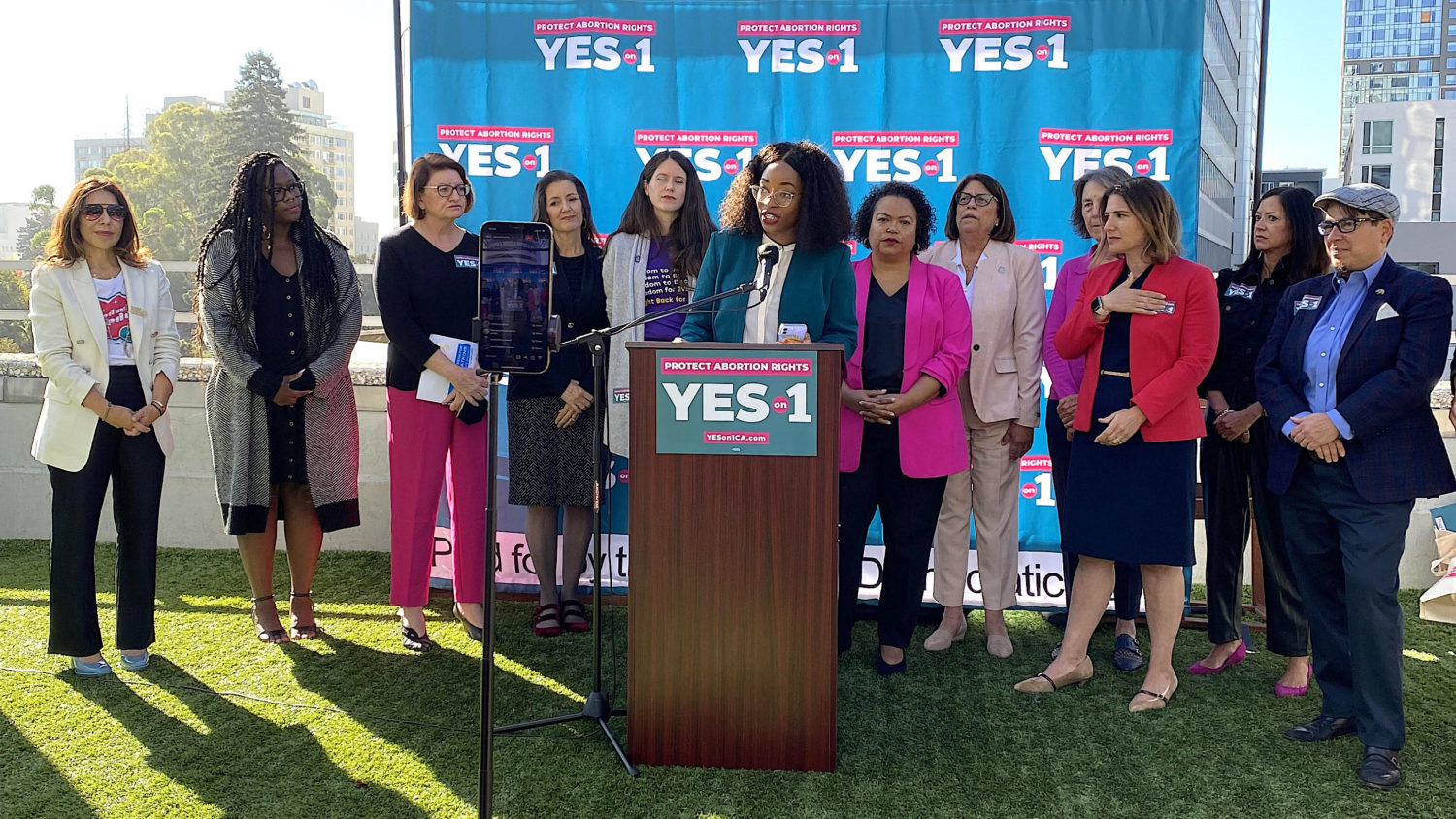
Yes on 1! (Courtesy Planned Parenthood)
“We’re grateful for the champions we have in California, including Gov. Newsom,” says Hicks. “I think it’s easy to be in California and say that you’re for women’s rights or reproductive rights, but it’s harder to make the investments and do the hard work to ensure that people are actually getting access to care. We’re creating an infrastructure by which people can seek care here, and for people that are outside of California as well. This takes a values commitment that we’re fortunate to have with this governor.”
But we had to ask, is it rock solid now that it’s in our constitution? “In terms of states rights, it’s written very plainly and clearly, we have constitutional protection for reproductive freedom, including abortion and contraception,” Hicks answers. “Now that we no longer have federal constitutional protection, if there was a federal ban on abortion, it would be in direct conflict with our California constitution. That would be taken up to the courts, and the attorney general would have to fight to protect it. But as long as we have states rights and protections, no future legislature or governor could institute a ban for Californians.”

My Body, My Choice talking box (Courtesy Planned Parenthood)
California voters have been loud and clear. Now it’s time to use our voices (and you don’t have to be a musician, political activist or high profile person to do so). In addition to its “Say Abortion” initiative, Planned Parenthood is launching “Our Body, Our Voice” a new space for women to share their stories. It will be at different places around California, including marches and protests, and be available on PP’s websites and social media for pro-choice campaigns and projects.
While a “red wave” never materialized, many senate and house seats went to anti-choice candidates who’ve stated their intention to further restrict women’s bodies moving forward. The fight, in some ways, has just begun. “A federal ban is everybody’s worst case scenario, and it’s been introduced, at least at some level, by the Senate already,” Hicks continues. “We have to use our tools to fight back against that. Our votes and our voices are the most powerful tools we can use because our policymakers have to act accordingly.”
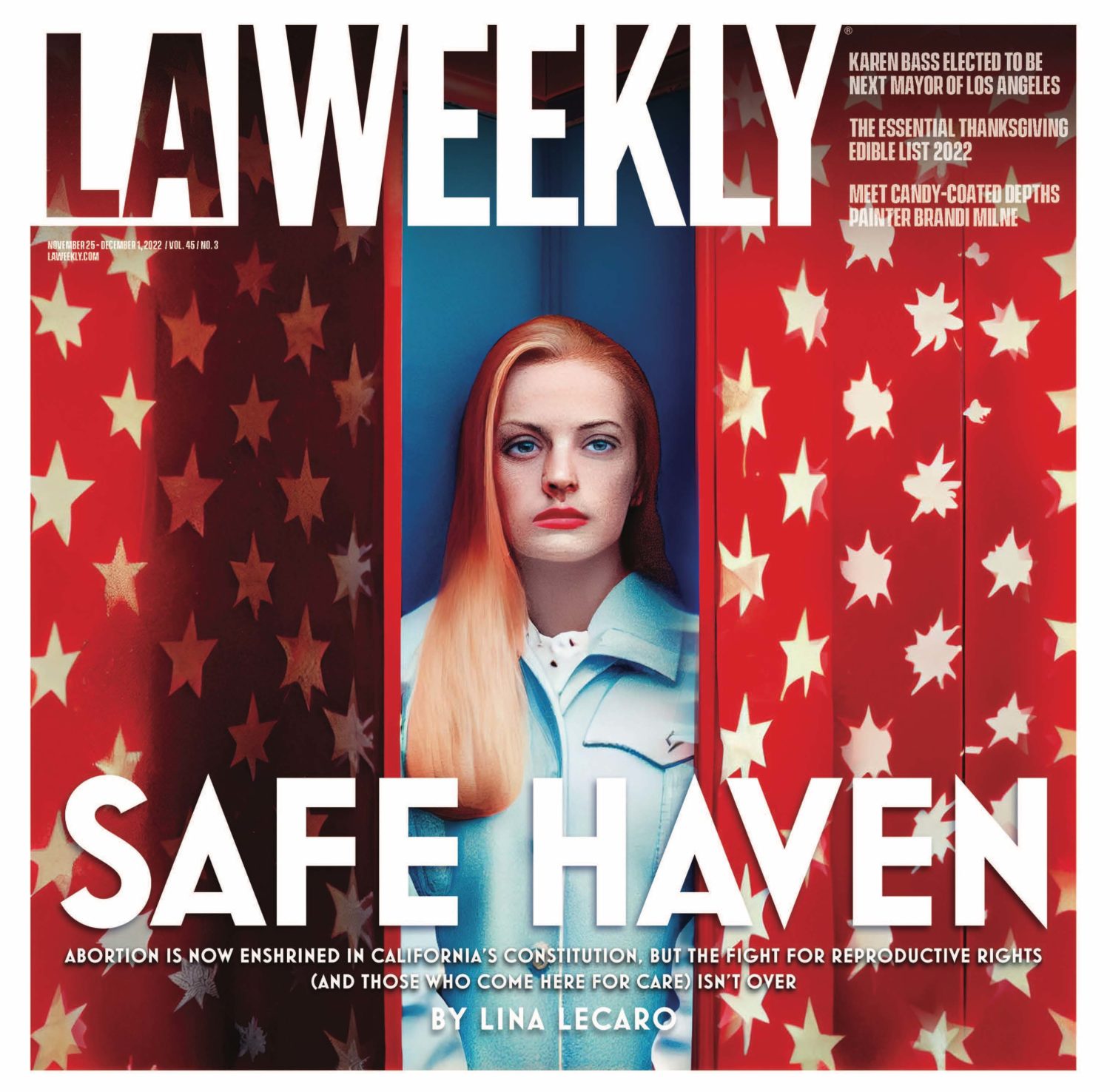
This week’s print cover story.
For more information go to plannedparenthood.org.
Editor’s note: The disclaimer below refers to advertising posts and does not apply to this or any other editorial stories. LA Weekly editorial does not and will not sell content.
Advertising disclosure: We may receive compensation for some of the links in our stories. Thank you for supporting LA Weekly and our advertisers.

